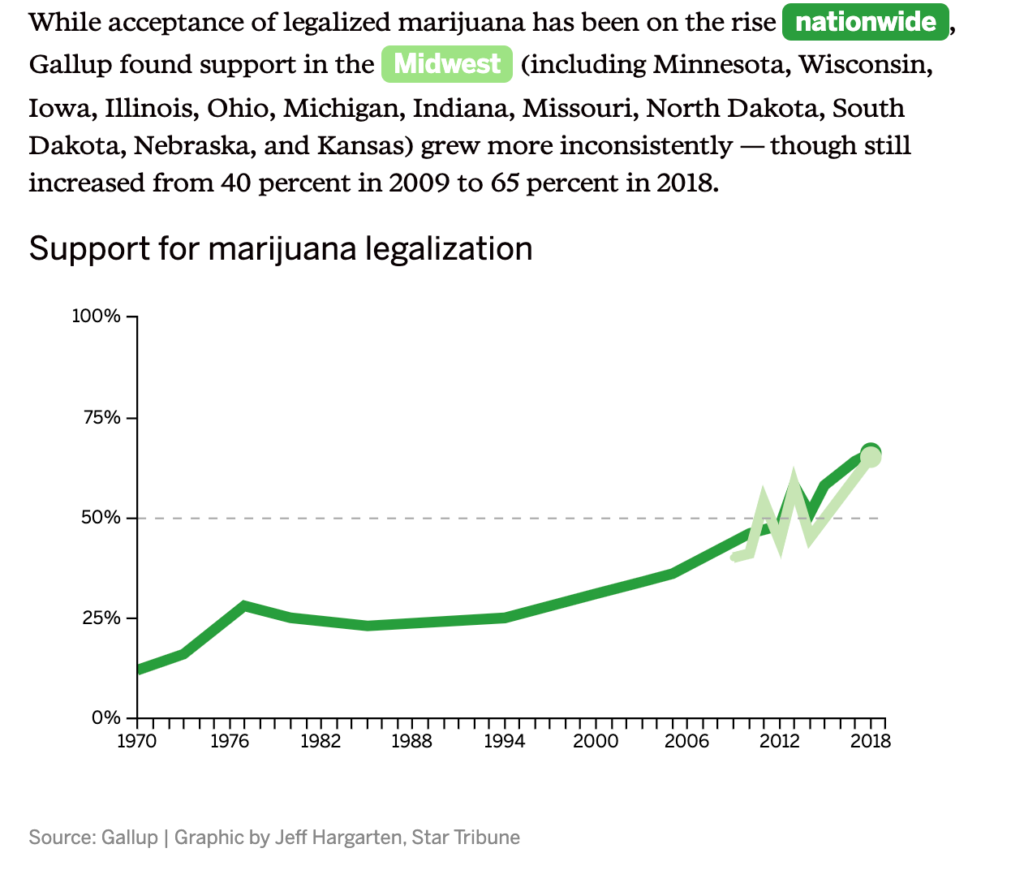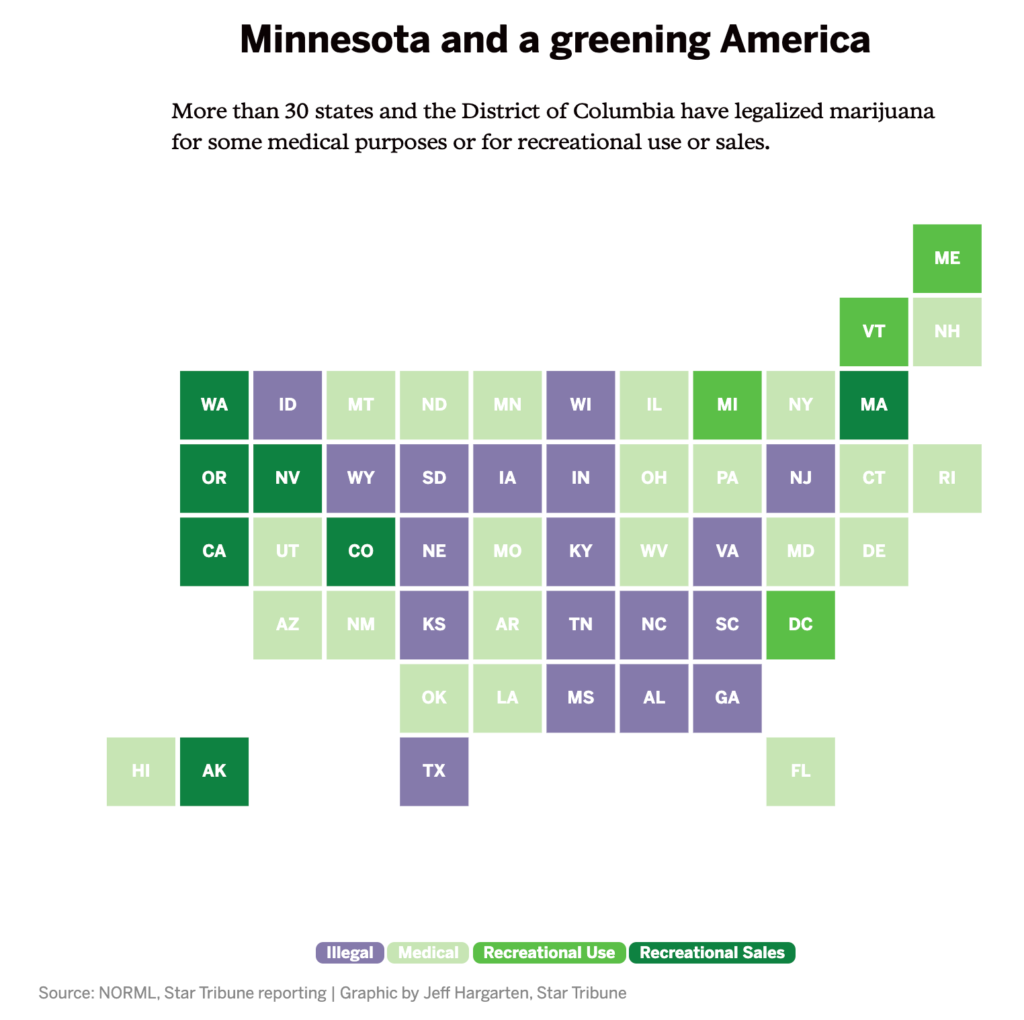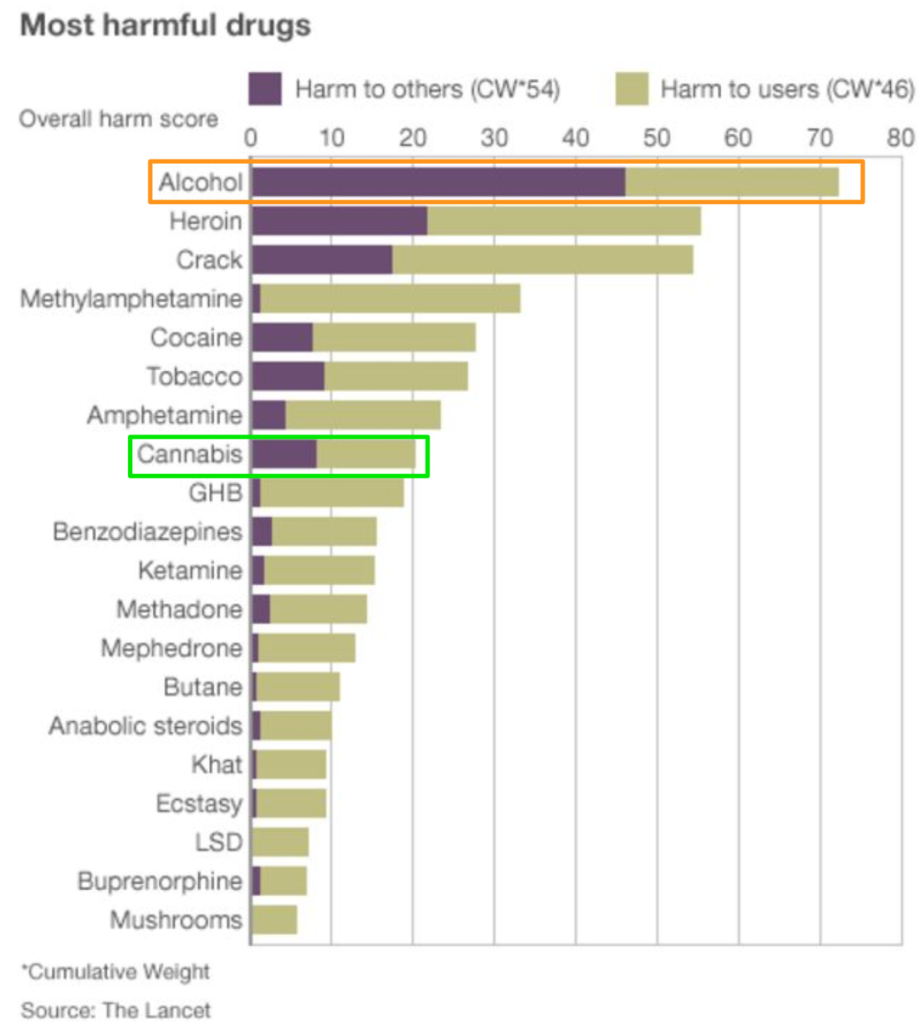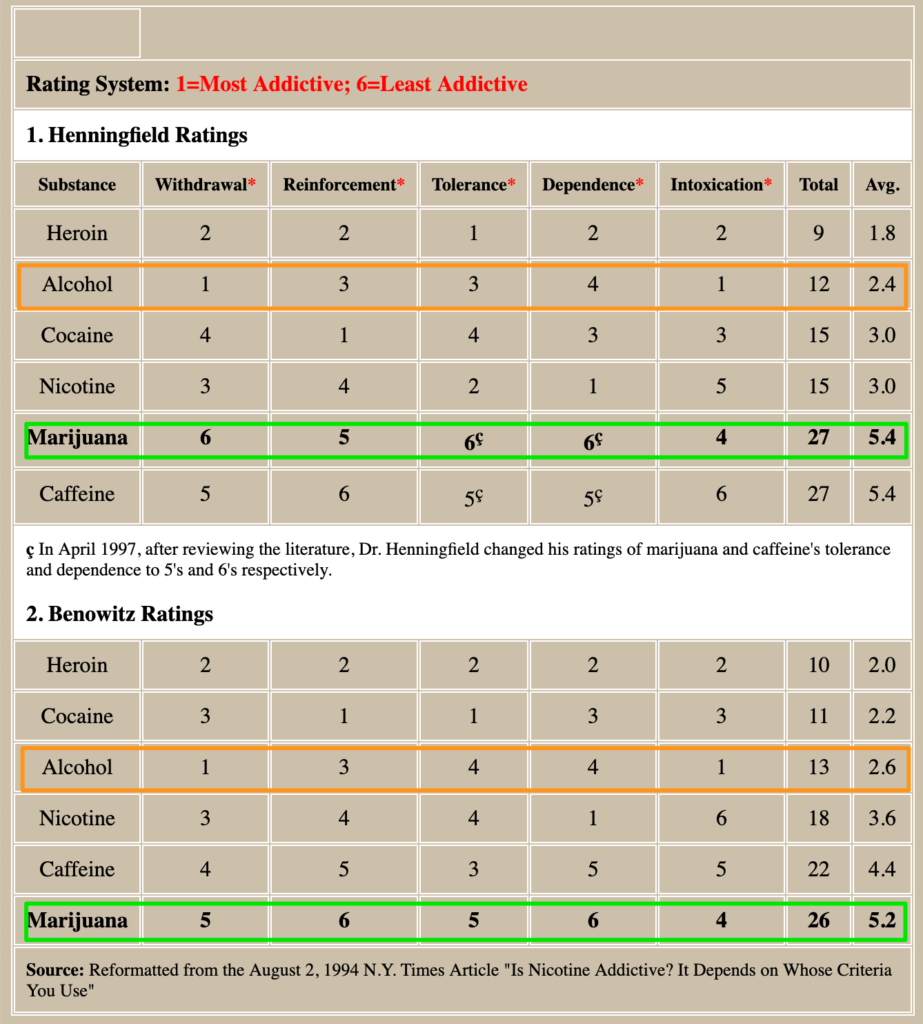Polls show that a large and growing majority of Minnesotans support ending marijuana prohibition. So why isn’t legislation moving forward in the Minnesota Legislature?

It appears that the size of majority simply isn’t quite large enough yet to overcome a number of factors working against passage, such as:
- Fear of Law Enforcement Lobbyists. The war on marijuana has kept a lot of law enforcement officials employed, so they have a self-interest in lobbying fiercely to preserve it. The political strength of law enforcement lobbyists is weaker than it has been in the past, but it is still relatively strong with some legislators.
- Minnesota Meekness. The Minnesota Legislature isn’t exactly brimming with bold leadership. When it comes to passing new laws, Minnesota tends not to be the first or last state, but pretty square in the in middle. With “only” eight other states out ahead of Minnesota proving that full legalization is not the disaster predicted by prohibition supporters, it still feels “too soon” to timid Minnesota leaders.

- Comfortable Status Quo. Finally, old habits just die hard. So many institutions have been waging a war on marijuana for so long that they just can’t seem to give up the fight.
So what will overcome those significant challenges? Even more public support. Deeper support is particularly needed in Greater Minnesota to persuade a few more Greater Minnesota legislators to get on the right side of history.
“Safer Than Alcohol” Campaign
How will we expand the level of majority support? By going directly to Minnesotans, particularly to Greater Minnesotans, with a thoughtful public education campaign methodically presenting the the mountain of evidence showing that illegal marijuana is safer and less addictive than already legal alcohol.
- LESS DANGEROUS. When it comes to harming the user and harming others, illegal marijuana ranks as much safer than alcohol. Marijuana is not benign, and steps should be taken to limit its harm. But British psychologist David Nutt (and could there possibly be a better name for a psychologist?) bundled a number of statistics into a “Harm Index,” and found that already legal alcohol and tobacco were both much more harmful than illegal cannabis.

- LESS ADDICTIVE. Contrary to the opinion of many skeptics, marijuana is also much less addictive than alcohol. Psychopharmacologist Jack E. Henningfield Ph.D., formerly of the National Institute on Drug Abuse, and Dr. Neal L. Benowitz MD of the University of San Francisco ranked marijuana less than half as addictive as alcohol. Both researchers found marijuana to be roughly as addictive as ubiquitous caffeine.

Once skeptical Minnesotans have been made aware of these kinds of facts, the question that needs to be posed is essentially this: If you don’t support prohibition for coffee, alcohol or tobacco, why support prohibition for marijuana?
Right now, those facts would be extremely surprising to many Minnesotans. Billions of dollars worth of Reefer Madness– and D.A.R.E.-style propaganda, law enforcement lobbying, and war on drugs news coverage has caused too many Minnesotans to believe the myths that marijuana is somehow much more addictive and dangerous than alcohol. Changing those misconceptions must be job one.
Advertising professionals can improve on this, but the summarizing tagline of the campaign could be something as simple as:
SAFER THAN ALCOHOL
End Marijuana Prohibition in Minnesota.
Tone Matters
Beyond having credible third-party proof points, the tone of this “safer than alcohol” campaign matters a lot. Unlike smoking joints on the Capitol steps and other similar self-defeating stunts, this “safer than alcohol” education campaign can’t have a whiff of headshop or hippy to it.
The off-putting counter-culture vibe of many tactics used by well-meaning proponents inadvertently drives away the disproportionately older Greater Minnesota moderates that must be persuaded so that their Greater Minnesota legislative representatives can be persuaded. The campaign needs to put a spotlight on credible third-party expert messengers delivering facts in a measured tone that is comfortable in Greater Minnesota.
Again, polls show that Minnesotans are ahead of their elected officials on this issue. But the majority needs to get just a bit bigger and more committed before enough elected officials representing Greater Minnesotans will have the courage to do the right thing and end marijuana prohibition. A thoughtful “safer than alcohol” public education campaign is a necessary next step.

I don’t know the source of this attractive piece. I do know something about the politics of drug prohibition, both nationally and here in MN. I encourage every sincere effort to promote objective and non-sensationalized, scientifically-based understanding of the effects of psychoactive substances—both their direct effects on those who take them, and the indirect effects as reflected in social, economic, public health, and political consequences of widespread consumption of mind- and mood-altering chemicals.
It’s sometimes the case that those who are well-informed about the pharmacology and the measurable effects such as acute or chronic somatic damage, or behavioral impairment, are then inspired to suggest reforms in public policies. Since the policies in need of reform are cemented into the state law—especially its criminal code—the advocates of reform realize they need to take their case into the arena of politics.
And that’s when a little humility would be in order. Expertise about the nature, effects, and consequences of psychoactive substance use and abuse does not necessarily equip someone to understand the political history, culturally-connected sub-texts, irrationality, corruption, and ignorance that combine to make the politics around the issue distinct, and which invalidate a great many of the premises, logic, and calculations that “conventional political wisdom” brings to the battle.
The basic error of the approach presented here is that it misses the point. The problem that requires political action in order to achieve legislative reform is NOT the relative danger or harmfulness of “marijuana”—it is the harm inflicted by the counter-productive legal strategy of prohibition. Prohibition is the problem. Arguing that hemp is safer than alcohol serves an educational purpose, if the public is well enough educated to be able to employ critical thinking skills.
[“Hemp,” by the way, is the English cognate of the Greco-Latin “cannabis,” and that’s the plant we are discussing. “Marijuana” is a legal fiction, a neologistic decoy, deliberately meant to demonize hemp by rebranding it as foreign or “alien,” and thereby eliciting that reliable xenophobic reflex which American demagogues delight to incite.]
I’ll spare you an in-depth dissection of this well-meant but rather naive and off-target (as I believe) essay, although I’d be willing to explicate the reasons for my disagreement, if you give me a call, or catch me out on a street corner as I keep on trying to help people get to the root of the matter.
Well put. I’m not 100% clear on what you mean by prohibition being the real problem. Prohibition in general, or of hemp in particular? I assume we’re talking only about hemp. And if so, the ‘less harmful’ angle is not a terrible way to begin to tear down the underlying myths and biases that led to its legal prohibition in the first place. As you noted, the effects of any psychoactive substance (or any drug, for that matter) should be considered before banning or prohibiting its use…that’s just common sense. I think contrasting it vs. alcohol, which no one thinks should be prohibited anymore, isn’t a bad thing to focus on. Remember that people take these things to alter their mood or behavior in the first place; and there is a possible medical/physical benefit too. The argument to ban cigarettes, which have only a negative health value, would be stronger than that against hemp, all things considered, no?
I’m persuaded by the argument you stress here to overturn prohibition. I agree that enforcement of prohibition is expensive and doing a massive amount of harm. I’m with you.
But to overturn marijuana prohibition, we need a few more pro-prohibition citizens to be persuaded to change their minds. For that reason, what is persuasive to me, you and others who already are pro-legalization is irrelevant.
We need to be asking this: What is persuasive to the folks still supporting prohibition?
The marijuana prohibition proponents I know drink alcohol and vehemently oppose alcohol prohibition. So, they’re willing to have some legalized vices in society. But here is where we lose them: They believe that marijuana is more dangerous to society than alcohol, and they’re sincerely worried about that.
They’re not persuaded by “too many are punished” because they think punishment is justified for a drug that they view as being much more addictive and dangerous than alcohol, and a gateway to more addictive and dangerous drugs.
Scoffing at their ignorance isn’t going to get this passed. To change that belief, they’re going to need proactive public education to bust those myths.
For many years, I worked with a public health coalition on secondhand tobacco smoke protection laws. Oddly, in some ways, this issue reminds me of that one.
On secondhand smoke (SHS) we were politically stuck for years on this: The non-smoking majority hated secondhand smoke. They wished it was gone. But they thought of it as a nuisance (i.e. stinks), not a public health threat (i.e. kills). Therefore, the public thought it was either an unacceptable denial of liberty, mean, or rude to pass what were at the time called “smoking bans.” They thought secondhand tobacco smoke was gross but a mere nuisance, something they could wash the smell out of their clothes and hair.
But after a large public education campaign — TV, radio, outdoor, online, PR — was done spotlighting a mountain of public health studies showing that SHS causes illness and death, and proposals were called “secondhand smoke protections” instead of “smoking bans,” poll numbers moved and long languishing local ordinances finally started passing. After enough local ordinances passed, a statewide secondhand smoke protection law ultimately passed.
People needed to learn that they couldn’t wash the cancer threat out of their hair. When that attitude changed, public support for protection laws changed. And when public support changed, politicians’ votes changed.
On marijuana prohibition, we’re stuck on this: A lot of people still mistakenly believe that marijuana is worse for you than alcohol. Because of that, they think marijuana prohibition, and all the punishment that comes with it, is justified while alcohol prohibition is not. Just like we needed a “secondhand smoke kills” public education campaign to overcome where we were politically stuck on that issue, we need a “safer than alcohol” public education to overcome where we are currently politically stuck on a very different issue.
What I don’t get Joe, is the weight of the pot-paranoid position in this debate. Is this really a generational issue? I ask because virtually every age peer of mine — urban dweller or rural — long ago dismissed the “Reefer Madness” theory of pot. Do you have any hard data on the “law enforcement lobbyist” factor? Again, generally speaking, I’ve talked with plenty of cops who could not care less about pot smokers, unless they’ve got a quarter ton of the stuff in their trunk. But to your point, someone is benefiting from the “pot kills” level of enforcement we still see. I suspect the liquor industry. (That’s kind of a joke.)
There were 588,000 marijuana arrests in 2016, more than were arrested for rape, murder, robbery, and aggravated assault combined. So yeah, I’d say law enforcement is still pretty obsessed with their war on marijuana. About 88% of the arrests were for possession. So, I’d say cops are still plenty focused on the small fish, not just the big fish.
It’s definitely generational — 74% of millenials support legalization, 63% for Gen X, 54% for Boomers, 39% for Silent. So one way to end marijuana prohibition is simply to wait until older people die. But if you don’t want to wait that long and punish millions of people in the process, you have to change some attitudes.
There is a reason why virtually all Americans opposes alcohol prohibition, but about one-third still support prohibition when it comes to marijuana. It’s because those disproportionately older Americans think weed is more harmful than booze. I would guess most think Reefer Madness-type propaganda overstates it, but they do think it’s more addictive, bad for your brain wiring, and a gateway to worse drugs.
That number for pot possession arrests is startling. But knowing average cop behavior, “possession” is an easy default charge when there’s no better reason to hassle someone. Kind of like insufficient tread depth on your tires if he can’t tag you for anything else. Obviously there’s some kind of revenue incentive baked into that kind of “enforcement”, not at all unlike the 37 stops cops pulled on Philando Castile before he met his end. Still, who pays to lobby to keep thay kind of ticky-tack bullshit going? Who truly benefits from it?
From Gallup, spring of 2019: Americans who favor legalization are most likely to point to the drug’s perceived medical benefits (98% say important) or to say it would free up law enforcement to focus on other types of crime (93% say important). Also, they say it is a matter of personal freedom and choice (89% say important), will raise a lot of revenue for state and local governments (86% say important), and regulation would make it safer (83% say important).
Among Americans who oppose marijuana legalization (THE RELEVANT GROUP FOR PUBLIC ADVOCACY PURPOSES), 91% say an important reason is that it would increase the number of car accidents involving drivers who use marijuana. 87% say a very important reason is that legalization would lead to more people using stronger and more addictive drugs.” 83% say “it would encourage people to use more marijuana.”
All of those are harm-related issues. Americans largely shrug off the same harms related to legalized alcohol, presumably because they think the extent of the harm from alcohol is less significant than the harm from marijuana.
https://news.gallup.com/poll/258149/medical-aid-top-reason-why-legal-marijuana-favored.aspx